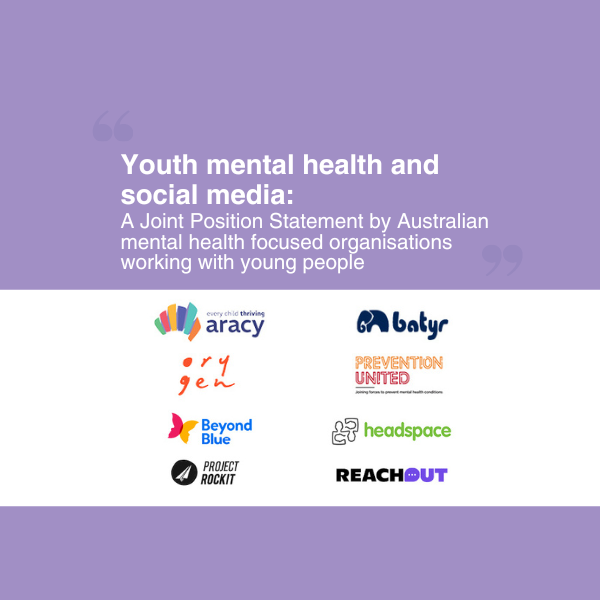
Youth mental health and social media: A Joint Position Statement by Australian mental health focused organisations working with young people
Social media can have a negative impact on mental health, however the current narrative blaming social media for the youth mental health crisis is overly simplistic and fails to address other important factors associated with poor mental health in young people. These include, but are not limited to, childhood maltreatment, family violence, poverty, climate change, the current cost of living crisis and future uncertainty. These areas should be considered high priority in any policy decisions that aim to improve the mental health and wellbeing of young people. Given the use of social media and other digital technologies is ever evolving, to keep young people safe and promote mental health and wellbeing we must actively engage them in defining the problem and collaborating on effective policy solutions.
Social media can be protective in facilitating connectedness, storytelling, engagement, creativity and sense of community. These protective effects can be even greater for young people living in regional and remote areas, and populations at higher risk of mental health conditions such as neurodivergent or LGBTQIA+ youth, but there is emerging evidence to suggest those protective factors can extend to young people who use social media to seek information, connect with friends and find inspiration.
Mental health organisations are dedicated to keeping young people safe and are working hard to ensure that young people can access appropriate information online and receive the support they need. The signatories to this position statement have therefore come together to request that the following be considered by policy makers:
We invite Government and policy makers to work with us to continue the conversation, ensure the voices of young people are heard, and develop evidence-based solutions to ensure that young people are safe online.
For further information please contact suzanne.dick@preventionunited.org.au on behalf of the signatories to this position statement.
SHARE THIS

With six connected areas, The Nest ensures young Australians have everything they need for the best start in life, helping them reach their highest potential.

Using The Nest, has helped ARACY to be at the forefront of disease prevention and the promotion of holistic health for young Australians.

Here you’ll see some examples of how The Nest has been used in organisations outside of ARACY across Australia.
Discover the latest in child and youth health and wellbeing through our newsletter. Subscribe now for ARACY news, events, and research updates.
Privacy collection statement
ARACY respects your privacy and is committed to protecting your personal information. When you interact with us, we may collect certain details to provide our services, such as your name and contact information. This information will only be used for purposes directly related to our business activities and will not be shared with third parties without your consent, except where required by law. By engaging with us, you consent to the collection and use of your information. For more details on how we handle your information, please refer to our full privacy policy.
ARACY acknowledges the Traditional Custodians and their enduring connection to the lands, waters, and skies. We pay our respects to Elders past and present and extend that respect to all Aboriginal and Torres Strait Islander people.
In solidarity, ARACY supports the Uluru Statement from the Heart and the need for truth-telling about the history and impact of colonisation. We treasure the rich and diverse cultures and customs of First Nations people – valued knowledge holders, leaders and partners in creating the conditions for all our children to thrive.